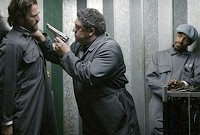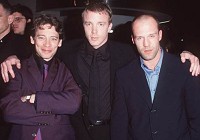 Into the Mind of Revolver
Into the Mind of Revolver After Swept Away you wouldn't think Guy Ritchie could have garnered even worse reviews from the critics. But his slick gangster movie Revolver has left most of us shaking our heads, trying to figure out what it's all about. Until things start to get confusing, it's an intriguingly entertaining film with lots of clever touches and nods to Scorsese, Tarantino and Fincher. Then it just gets totally baffling. To help us sift through the cobwebs in our brains, let's go straight to the source, starting with the writer-director. And yes, it does help to get some answers...
After Swept Away you wouldn't think Guy Ritchie could have garnered even worse reviews from the critics. But his slick gangster movie Revolver has left most of us shaking our heads, trying to figure out what it's all about. Until things start to get confusing, it's an intriguingly entertaining film with lots of clever touches and nods to Scorsese, Tarantino and Fincher. Then it just gets totally baffling. To help us sift through the cobwebs in our brains, let's go straight to the source, starting with the writer-director. And yes, it does help to get some answers...
Where did the inspiration for Revolver come from?
Ritchie: It was a culmination of concepts really, but a germ got stuck in my mind about one particular concept: the con of all cons. Iím fascinated by how you can trick the mind and the individual, and this concept was so audacious, so radical, that I was attracted to say the least. The formula of the con is quite simple Ė you seduce people by their own greed. We can all be conned but at what point do we realize that weíre being conned and to what point do we allow ourselves to be conned. There was a famous book called The Big Con, which works on the formula that it is impossible to con an honest man. I was attracted to that idea too. The great challenge then was to take an intellectual concept and clothe it in an exciting, action-packed narrative because concepts are not necessarily interesting to look at. Itís important that the film delivers on an entertaining level. What you want in the cinema is entertainment but I like to be intellectually titillated while being sensorially stimulated. It took me three years to write this film whereas Snatch took me three months. Fundamentally, itís not a very complicated film, itís actually quite simple, but to clothe it within a narrative was quite complicated.
Why did you call it Revolver?
Ritchie: Iíve always been surprised that no other movie has ever been called Revolver because it just sounds cool. So I like the name but I also like the concept that, if youíre in a game, it keeps revolving until you realize that you are in a game and then maybe you can start evolving. The film is based on the formula of a game: where does the game start, where does it stop and whoís conning who.
Is it a film with a message?
Ritchie: I donít think there is a message in the movie. The idea is that that there is no such thing as an external enemy. Jake Green is playing against Jake Green. Thatís quite a hard concept to get your head around initially Ė of course, if there is only an internal enemy, he wouldnít want you to get your head around it. So itís based on the formula that you can only get smarter by playing a smarter opponent. Who is the ultimate opponent? Yourself. Then comes the principle that your enemy will always hide in the last place that you would ever look. The last place you would look is inside your head and the last place you would look inside your head is behind fear. Iím not saying that formulaís correct, itís just a formula and Iím interested in formulas. In this particular instance, the only opponent Jake Green has to challenge is himself by doing exactly what he doesnít want to do.
To that extent, are his experiences an allegory for life?
Ritchie: Itís funny, I never expected as a writer-director to end up talking about high-falutiní concepts. I got into filmmaking because I was interested in making entertaining movies, which I felt there was a lack of. Jake Green isnít just Jake Green. Jake represents all of us. The color green is the central column of the spectrum and the name Jake has all sorts of numerical values. All things come back to him within the filmís world of cons and games. Jakeís on a journey of how to play the game. Heís very good at playing games and heís done very well out of playing by a certain formula but he didnít realize how big and consistent that formula is. He only saw the formula in its microscopic form and didnít realize that it could be macroscopic.
How does he get drawn into the game?
Ritchie: One of the first rules of business is to protect your investment. I like the idea that we do the same with our personal philosophies. Once we have decided whatís right, irrelevant of whether we are right or wrong, the more energy we will invest to protect that. Which is basically how conmen work. They get you to invest a little bit, then a bit more. They never tell you to buy something, just take a look. Even lookingís an investment. Once youíve contributed some of your energy to looking - appraising a certain article - then a small investment has been made. From a small investment comes a larger investment, from a larger investment comes a greater investment until eventually youíve invested so much that you canít be wrong. Because if you are wrong, it must mean youíre stupid and nobody can admit that theyíre stupid.
Jake is prompted to invest to counteract the threat of a fatal disease thatís hanging over himÖ
Ritchie: The only way to handle this concept within an hour and 45 minutes of film is to cut to the chase, and thereís nothing quite like death looming on the horizon to precipitate events. Letís get the party started, and the only way that can happen is the imminent threat of death.
If Jake Green represents all of us, what do the other characters represent?
Ritchie: The other characters all represent a certain human characteristic. Jake, Avi and Zack represent one characteristic. Then thereís Dorothy Macha, Lily Walker and Lord John, who represent another aspect of our nature, different aspects of vice, of which there are lots of ingredients so I wanted to be specific about which character represents which vice.
Does that mean Jake, Zack and Avi are on the side of good and the others on the side of evil?
Ritchie: I hesitate to use the words good and evil because this is not a story about morals and ethics, this is simply a story about the game and there is no right or wrong. Itís about whether you win and how quickly you can win. Jake, Zack and Avi represent players who have decided to win in this game, and that leads into the slightly more radical concept of how to win the game. Weíre all players within our own little games, so we embody all of these characters, we embody all the aspects of vice, we also embody all the aspects of competition, wanting to play the game and succeed in the game. All of the characters represent aspects of ourselves. For example, Sorter represents the aspect of our character in which we have taken a left-turn somewhere and later on decide that the right-turn might have been the better idea. He represents the u-turn within us when we think weíve gone the wrong way or when weíve decided to take a different path than the one weíve been on, which is of course a terribly difficult thing to do.
And who is Sam Gold?
Ritchie: I like the idea that Sam Gold is a collective hallucination. He doesnít really exist but he does exist. He has no power of his own, he only has the power that you give him. Heís as real as you believe him to be. In the context of the film, he is the opponent, the force that the individual in the movie has to overcome. Is Sam Gold evil or is he good? Thatís up to the individual to understand. I love the concept that if this was all a game, evil may not actually be evil. That if there is such a thing as the devil, the devilís only job is to be smarter so that we can become smarter. I have no idea if this holds water philosophically or theologically, but itís a very slick concept. Thatís basically what inspired the film: that the devil isnít a bad guy, the devil is just a very clever guy, and the idea that Sam Gold is really just a very smart opponent.
Where is the film set?
Ritchie: The movie is set in no-manís land. Itís a kind of transatlantic destination that is really supposed to be illustrative of East meets West somewhere in the middle of the Atlantic. In fact, we shot most of it in London and the Isle of Man, which isnít quite the middle of the Atlantic but itís going that way.
How did you create that transatlantic atmosphere? Did you use a lot of special effects?
Ritchie: Unlike my previous movies, thereís quite a lot of studio work on this one because of the very nature of the fact that I wanted an environment thatís transcontinental. Because of that we had to revert to green screen. I donít care whether I use special effects or not. My principal job is to make interesting and entertaining films, and Iím not proud of which format or which particular technique I use. I just wanted the film to look good and that was about the only request I had of my DP. We wanted it to be slightly over the top in terms of photography. What I liked about American movies when I was a kid was that theyíre sort of larger than life and I think Iím still suffering from that reaction. Tim, the DP, was completely unbridled by me. The cheekier he got, the more I applauded him. Heís his own boss in that department. 




GUY RITCHIE
born 10.Sep.68 in Hatfield, Herts
FILMOGRAPHY

Swept Away (2002)
The Hire: Star (2001)

Lock, Stock and Two Smoking Barrels (1998)
The Hard Case (1995)
NB. Lock, Stock and Two Smoking Barrels was one of Shadows' Top 5 films for 1998.
